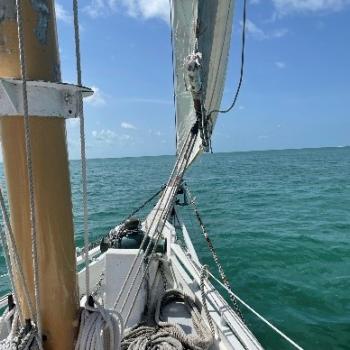Immersion in water is an outward temple purification ritual that Jesus' followers must undergo. But it is immersion in the Spirit, which only the Messiah brings, that allows one to truly worship the Father in spirit and truth. With the coming of Jesus, we can at last truly and fully know who and what we worship, and, with this knowledge, our immersion in the Spirit permits us to worship the newly revealed Father in spirit and truth. The universal Father can now be worshipped anywhere, not excluding the Jerusalem temple or a synagogue. Believing Jesus is the Messiah allows one to know God the Father, and immersion in the Spirit allows one to worship the Father in spirit and truth. And even if the temple is to be destroyed, it will still be possible to continue to worship the Father in spirit and truth.
God Is Spirit
Jesus also makes the statement that "God is spirit" (Jn. 4:24). Although historically most Christians have taken this passage as a theological statement about the nature of God, in its original context it is probably describing a quality of God rather than his nature. Other similar passages say "God is light" (1 Jn. 1:5), and hence we can be enlightened (Jn. 1:9). "God is love" (1 Jn. 4:8, 16), and hence we are bound to him in love. "God is true" (Jn. 3:33) and "faithful" (1 Cor. 10:13), and hence we can have faith in his Messiah. "God is a consuming fire" (Heb. 12:29, 1:7; Rev. 2:18, 19:12), and hence we are immersed in "the Holy Spirit and fire" (Mt. 3:11; Lk. 3:16; Acts 2:3). Thus, "God is spirit" (Jn. 4:24), and hence we can and must worship him in spirit and truth.
John 4:19-26 also includes the first uses of two important phrases in John: "the hour is coming" (4:21, 23) and "I am" (egō eimi) (4:26). Both of these have technical meanings that will be discussed in detail in later explorations.
A pdf of the full version of this column, with extensive references and notes, can be found at:
http://byu.academia.edu/WilliamHamblin/Papers/438416/John_4_19-26
Updates and discussion can be followed on Facebook at:
http://www.facebook.com/pages/An-Enigmatic-Mirror/180889785272535





